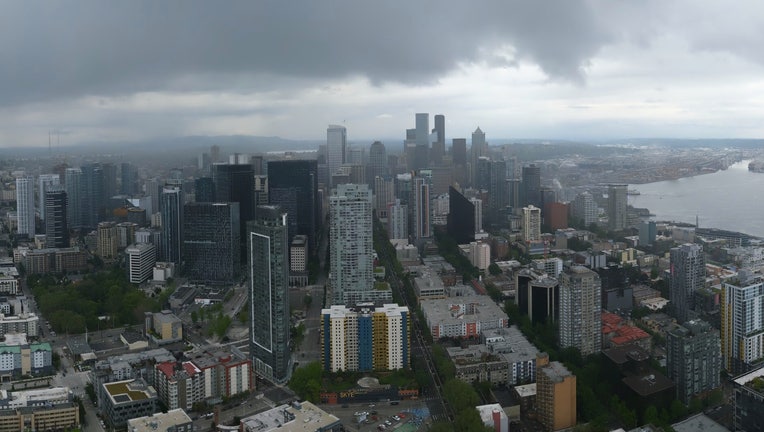Seattle ranks 9th among major US cities for seasonal depression

Cloudy Seattle Day from Space Needle (Space Needle Panocam)
SEATTLE - Seattle has ranked among the top ten major United States cities impacted by seasonal depression.
With Labor Day behind us and meteorological fall in full swing, researchers look at the concentration of seasonal depression.
"From 1st September to the winter solstice on 21st December, the amount of daylight hours in Seattle drops from 13:19 to 8:25, a decrease of 37%. That is bad news for many Seattle residents," says researchers with CBD brand Spruce.
What is Seasonal Affective Disorder (SAD)?
It is a type of depression characterized by a recurrent seasonal pattern, with symptoms typically lasting 4-5 months, according to the National Institute of Mental Health (NIMH).
The institute says approximately 5% of the U.S. population experiences seasonal depression each year, or about 16.5 million people.
How and why is SAD worse in Seattle?
Spruce ranked Seattle as the ninth-most impacted city by SAD, here's why:
"Seattle's location in the Pacific Northwest contributes to long, dark winters with frequent overcast skies and rain. The combination of significantly shorter days, lack of sunlight, and damp climate can substantially impact residents' mood and energy levels. The city's tech-driven culture and indoor lifestyle during winter months may also contribute to the high prevalence of SAD-related concerns among residents," Tony Spencer, CEO and mood expert at Spruce, explains.
Like clockwork, between September and March, people researching seasonal depression are at their highest. By September 5th, searches for "seasonal affective disorder" were already up 33% compared to August.
How can Seattle and Western Washingtonians minimize the impact of SAD?
Seattle has rare sunny days in the fall and winter. Experts say to do what many do already: take advantage of outdoor time on those days as much as posisible. This could be in small ways such as outdoor lunch breaks.
With Seattle-area residents often working indoors or remotely, another solution is to position your desks towards windows to increase natural light exposure.
With an expansive park system in the city, researchers suggest walks throughout the day through parks like Discovery Park, Green Lake, and more.
Exercise can reduce the impacts of SAD as well, according to Spruce. While outdoor exercise also increases natural light, on days which do not allow that then even indoor physical activity can stave off the worst effects of SAD.
MORE NEWS FROM FOX SEATTLE
Green River Killer Gary Ridgway booked into King County Jail
Highline Public Schools to stay closed Tuesday due to ongoing cyberattack
'Belltown Hellcat' spotted on tow truck in Kent: Reddit
Ballard Bridge weekend closures start Friday. Here's what to know
Seattle market sees rise in home listings, higher prices
To get the best local news, weather and sports in Seattle for free, sign up for the daily FOX Seattle newsletter.

